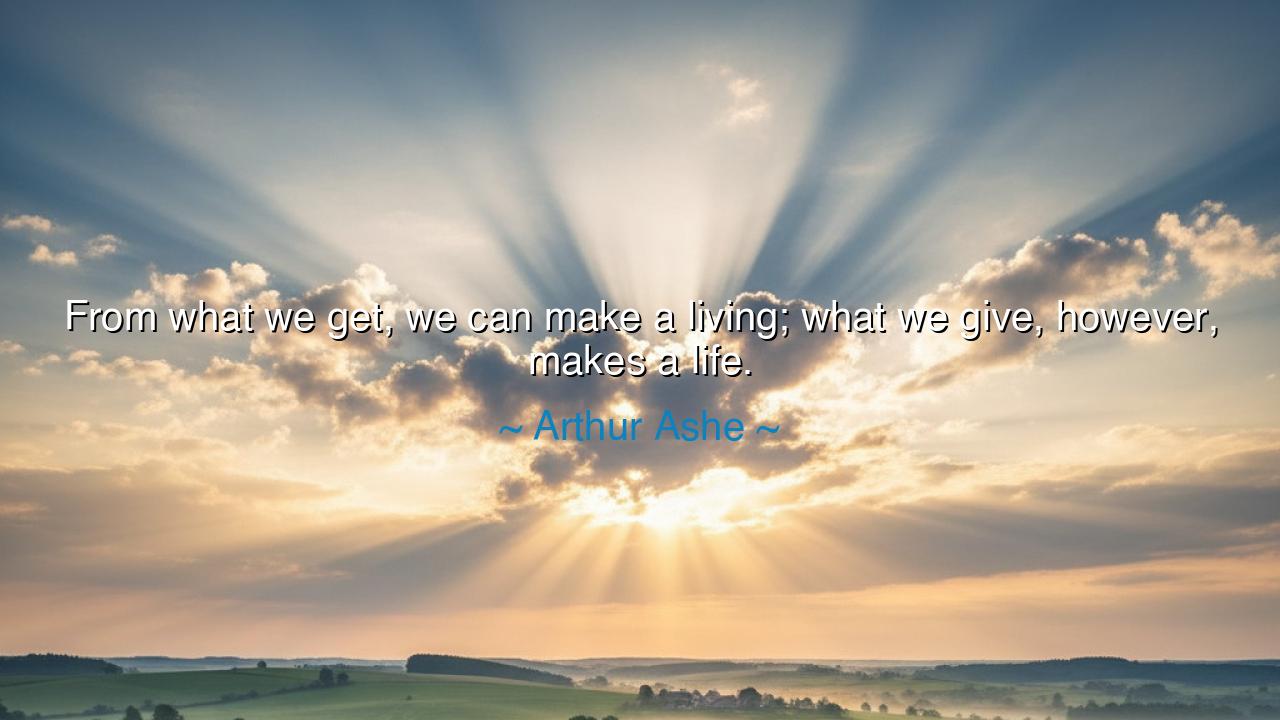
From what we get, we can make a living; what we give, however






“From what we get, we can make a living; what we give, however, makes a life.” — thus spoke Arthur Ashe, the noble athlete and gentleman of grace, whose words echo like the tolling of a temple bell across the ages. In this profound reflection lies a truth both tender and eternal: that a life’s worth is not measured by what we possess, but by what we bestow. To make a living is to survive; to make a life is to serve. The first fills the hands — the second fills the soul.
Arthur Ashe knew this truth not as philosophy, but as experience carved by struggle and humility. Born into a world that sought to limit him by the color of his skin, he rose, not with anger, but with dignity. On the courts of tennis, he triumphed — the first Black man to win at Wimbledon — yet even in his victories, he understood that glory fades, while goodness endures. What he gained brought him comfort, but what he gave — his wisdom, compassion, and unshakable example of courage — lit a path for generations to come. He gave voice to the voiceless, hope to the defeated, and dignity to all who watched him bear hardship with grace.
In his later years, when illness struck him, Ashe’s body weakened but his spirit grew stronger. He could no longer play the game he loved, yet he continued to give — to teach, to uplift, to speak of peace and perseverance. He showed the world that true greatness lies not in achievement, but in generosity of heart. His life became a living parable of his own words: what he had received built his career, but what he gave built his legacy.
This teaching, though spoken by Ashe, carries the wisdom of the ancients. For even the sages of old declared that wealth without virtue is a barren tree. The Stoics, the prophets, the philosophers — all knew that man’s purpose is not accumulation, but contribution. The farmer who grows grain may feed his household; but the one who shares his harvest feeds humanity. The merchant who hoards gold may prosper for a season; but the one who gives freely becomes rich in the only currency that endures — the currency of love and honor.
Consider the life of Mother Teresa, who walked among the poorest of the poor in Calcutta. She possessed nothing — no mansion, no title, no earthly reward — yet her giving moved kings and nations. She had no fortune to spend, yet she gave of herself, her time, her strength, her heart. Her life was proof that the soul, once awakened to compassion, needs no riches to live abundantly. Through her, as through Ashe, the eternal truth was revealed: what we give makes a life.
To make a living is necessary — to labor, to earn, to sustain one’s body. Yet if life ends there, it remains incomplete, like a song without harmony. The true fullness of existence begins when we give — when our hands, once busy gathering, learn to open. For in giving, we discover connection; in service, we find meaning. What flows from us returns magnified; what we share becomes eternal. The ancients called this the “circle of life’s abundance” — that what we give freely enriches not only others but ourselves, weaving us into the vast and sacred tapestry of humanity.
Therefore, my child, remember this sacred order: Make your living with your hands, but make your life with your heart. Work diligently, but never let your toil harden you. Earn, but also share. Strive, but also serve. Give time, give kindness, give forgiveness — for these are the gifts that outlast gold and glory. Every act of generosity, no matter how small, becomes a spark in the vast light of eternity.
And when your final day comes, as it must to all, it will not be your possessions that speak for you, but the lives you touched. Then the world will say, as it said of Arthur Ashe: He made his living with excellence, but he made his life with love. So give freely, live nobly, and let your life — through every word and every deed — become a blessing that continues long after you are gone.






AAdministratorAdministrator
Welcome, honored guests. Please leave a comment, we will respond soon